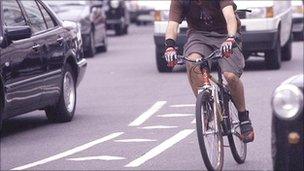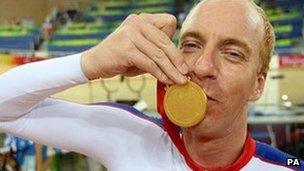Welsh Cycling president Bill Owen urges bike aggression
- Published

Welsh Cyclist president Bill Owen says those using bikes should assert themselves on the roads
Cyclists have been urged to show extra aggression on the roads to make drivers more aware of them.
The call came from Welsh Cycling president Bill Owen who says cyclists should not be afraid to ride in the middle of the road.
It comes after Paralympic cycling champion Simon Richardson was critically hurt in an alleged hit-and-run.
One motoring organisation said all road users needed to give each other space.
Cycling is one of Wales' biggest tourist attractions and on the rise.
"We are up against it with car drivers," said Mr Owen. "The more cyclists that are out there, the more accidents are increasing.
"These accidents are getting noticed more.
"It's about making car drivers more aware of the cyclists out there. The majority of motorists are tolerant but there are some yobs out there who make it tough for cyclists.
"Yes, there are awareness campaigns going on but it needs more than cycling organisations to do this.
"At the end of the day the authorities and Welsh Government need to act.
"There's even one side to it that cyclists aren't aggressive enough. It's safer to ride away from the kerb where there are cars parked and gutters."
Mr Richardson, 44, who won two gold medals and a silver at the 2008 Beijing Games, was cycling near Bridgend on Wednesday morning when he was in collision with a white van and thrown to the side of the road.
'Acceptance on the road'
He was taken by air ambulance to the University of Wales Hospital, Cardiff, where he is undergoing treatment for multiple injuries.
His wife said he is in a "critical but stable condition".
Friend Enda Smyth, a member of the Irish Paralympic team, believes the roads are becoming more dangerous to cycle on.

Simon Richardson is a double Paralympic champion
"I think it's shocking the way it's gone with the roads," he said. "I think they are more dangerous now.
"Motorists are aware of what's going on and I think it's just the acceptance on the road.
"The altercations are getting closer and closer. I hear about it each week about people being run off the road and a lot of close calls."
Wales has over 2,000 members belonging to British Cycling which was dealt with 40 claims for accidents in the last two years, and national governing body expressed concern about incidents.
Martin Gibbs, policy affairs and legal director for British Cycling said: "It's a huge issue.
"We are currently going through a process of surveying our members to see what they think is the most important issue.
'Drivers' sentences'
"The general feeling is varied but that it's about awareness and mutual respect between cyclists and motorists.
"There's a lot that can be done from the UK government perspective.
"If we and the government are encouraging more people to get on their bikes, it's our responsibility to make sure the roads are as safe as they can be."
Mr Gibbs said some of the feedback they were already receiving from their survey includes changes to the driving test to incorporate more awareness.
It also focuses on sentences handed out to drivers involved in accidents with cyclists as well as road layouts.
The Institute of Advanced Motorists said it completely agreed that cyclists should assert themselves on the road.
The institute's head of cycling Duncan Pickering said: "Cyclists are safer at junctions if they move towards the centre of the road - the single biggest cause of cyclist fatalities is cycling on the left hand side of large vehicles at junctions. It's called undertaking for a reason.
"But there is a big difference between assertion and aggression. All road users need to give each other space, and respect the Highway Code to create a safer road environment."
The Welsh Government said it provided funding to councils across Wales to improve road safety for vulnerable road users.
"It will continue to work with local authorities and organisations such as Sustrans to reduce casualties amongst these groups," a spokesperson said.
- Published18 August 2011
- Published18 August 2011
- Published17 August 2011
- Published10 May 2011
- Published7 April 2011